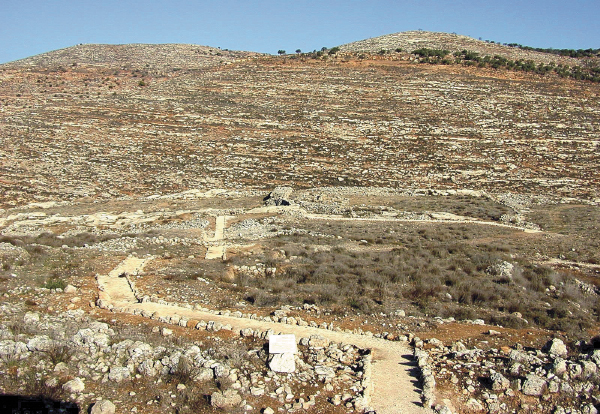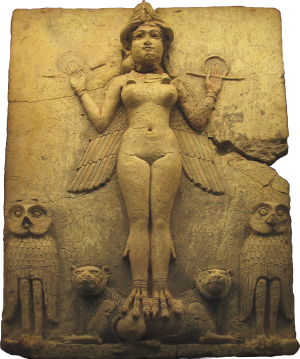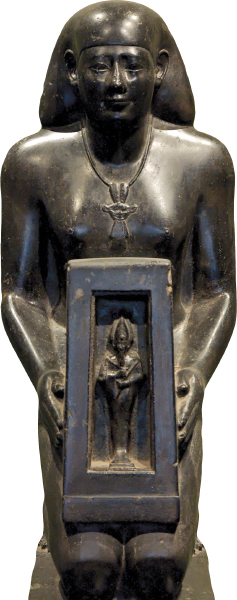Prophetic Preaching at the Temple Gate (7:1–29)
Stand at the gate (7:1). Standing at the temple gate guaranteed a large audience for Jeremiah’s proclamation. Gate areas in the ancient Near Eastern world were places where much human activity and traffic took place (see comment on 1:15). The particular area where Jeremiah stands is an area outside the temple called the “inner court.” We cannot be sure which gate Jeremiah is facing, but he surely has direct contact with the majority of the temple worshipers. Jeremiah chooses this place as well as a number of city gates (e.g., Potsherd Gate, Benjamin Gate) to proclaim the messages he receives from God.75
To worship the LORD (7:2). Worship in the Hebrew Bible is expressed by different terms. Two words are essential to understand Israelite worship: one that means “service” and the other that designates “prostration” or “bowing down.” It is this second term that is used here (see sidebar on “Bowing Down”).
“This is the temple of the LORD” (7:4). The triple repetition of this phrase seems to point to some kind of magic incantation that invokes protection. Perhaps this is similar to the triple expressions that appear at the beginning of Babylonian magical texts known as Maqlû.76 During the time of Jeremiah the people have apparently developed a kind of blind superstition regarding the temple.

Arad ostraca referring to the “house of God”
Z. Radovan/www.BibleLandPictures.com
At least two concepts come into play at this time. (1) As long as the temple stands on Mount Zion, popular belief is that this guarantees God’s protection of Jerusalem because the temple “houses” God’s presence. (2) This belief was strongly enhanced by God’s intervention during the time of Hezekiah, when Jerusalem was saved from total destruction at the hands of the Assyrian king Sennacherib, who had placed the city under siege. This divine intervention helped nurture the ideology that the temple in Jerusalem was inviolable.
One can see a possible parallel here with the Mesopotamian concept of a city’s patron deity. Such deities in Mesopotamia, who were limited in power geographically, were the protectors of the temple (the house of the deity) and of the city. As long as there was an earthly abode for the deity in a given city, the city had special protection. In the case of Israel, it seems that the influence of its neighbors, as well as the interpretation of God’s divine intervention, led to the ideology known as the “inviolability of the temple,” which also then meant that Jerusalem was secure. As Jeremiah is quick to point out, this is false.77
The alien, the fatherless or the widow (7:6). These three categories of persons are symbolic of the most vulnerable classes of people in the ancient Near East. Ancient law codes, such as those of Ur-Nammu and the Code of Hammurabi, show a preoccupation with protecting the rights of the poor, the widow, and the orphan. There is also a text from Egypt (2258–2052 B.C.) that speaks of a farmer in the courts of that country. When the farmer appeals to the judge, he refers to the judge as “the father of the orphan, the husband of the widow, the brother of the divorcee, and the apron of him that is motherless.”78
In the case of the Israelites, the underlying argument for caring for the vulnerable is that they had been slaves in Egypt and had to be careful in how they treated those at a disadvantage in society. In both Deuteronomy and Exodus one can find humanitarian concerns spelled out as well as the reminder that God’s people were once oppressed slaves in Egypt. These texts serve as the basis for the prophet’s call to do justice, that is, to create contexts where justice in the biblical sense prevails. What seems unique to the Israelite context in contrast to the Mesopotamian one is the concern for the resident alien (Ex. 22:21–22).
Do not shed innocent blood (7:6). This accusation was already mentioned in 2:4. There are explicit teachings in Deuteronomy against shedding innocent blood (Deut. 19:10, 13; 21:8–9). We cannot be sure what specific situation Jeremiah is referring to here. Probably the warning covers more than possible murders in the temple. We find out later that King Jehoiakim was responsible for shedding innocent blood (22:3, 7). He was also responsible for killing the innocent prophet Uriah (26:20–23).
Burn incense to Baal (7:9). The term used here for incense is different from the one used in 6:20 (see comment). Here the author uses an intensive verb that can also be translated “offer sacrifices to Baal.”
In this house, which bears my Name (7:10). In the ancient world, naming a person or an object meant having ownership and authority over that person. The Hebrew idiom “the house that bears my Name” depicts God’s ownership of the temple. By placing his name on the temple, God declares he has legal rights over it and considers it his personal property. Here God proclaims that he cares deeply for the temple and that only he should be worshiped in this place.
This is equally true in the ancient Mesopotamian context. The temples were considered to be private residences of the deities.79 The presence of the deity in the temple, as in Israel, provided protection for the worshiper. A significant difference between the Mesopotamian deities and the God of Israel was that the power of the Mesopotamian deities was limited by geographical contexts (see comment on 2:28), whereas the God of the Bible is considered to be omnipotent. This is not to say that there was not a belief that the gods had a universal concern for humankind. Some texts suggest that a few of the Mesopotamian gods intended to care for groups of peoples outside Mesopotamia.80 Yet the Mesopotamian gods seem to be much more restricted to their geographical base where they were worshiped than the God of Israel.
Shiloh (7:12). Shiloh is identified with modern Khirbet Seilun, located north of Bethel in the heart of Ephraim. This town served as the central worship place for the Israelites from the time of Joshua until the days of Samuel. The Israelites placed the ark of the covenant and the tabernacle there, and this is where God established his name in the early years of Israel’s occupation of the Promised Land. Archaeological excavations have shown the presence of impressive architecture that lasted until a fierce destruction that took place in the eleventh century B.C.,81 when presumably the Philistines destroyed Shiloh (cf. 1 Sam. 4). After this time, Shiloh never again served as the primary worship center. By Jeremiah’s time, Shiloh did not have a sanctuary, though there is evidence of human occupation there well into exilic times.

Shiloh
Todd Bolen/www.BiblePlaces.com
Towns of Judah and streets of Jerusalem (7:17). This is most likely an idiomatic phrase that Jeremiah uses in order to emphasize that idolatrous worship is practiced everywhere in Judah (cf. 2:28, where the prophet accuses the people of Judah of being no different from their polytheistic neighbors). This kind of statement is illustrative of the extent to which the ancient Near Eastern neighbors had an influence on the belief system of the Israelites at this time.
Cakes of bread for the Queen of Heaven (7:18). The word for “cake” is a loan word from the Akkadian language. There is considerable evidence from places such as Mari that the Babylonians used cakes in the worship of the Assyro-Babylonian goddess Ishtar. These cakes were baked over an open fire, not in an oven. A number of clay molds for cakes from the second millennium B.C. have been discovered in a palace kitchen at Mari. Some have a female shape and others are star-shaped. Presumably both are representative of a female goddess.82

Queen of Heaven, probably Ishtar
Ian Goulden, courtesy of the British Museum
It is impossible to state with absolute confidence that the Queen of Heaven is linked to the goddess Ishtar. Yet despite scholarly debate over the years, there is no better candidate. Ishtar is the goddess of love, sexuality, and war, and there certainly was Mesopotamian influence in the worship practices of Judah, particularly from the time of King Ahaz until the reign of King Zedekiah.83 Another proposed candidate from a Canaanite context is the goddess Asherah.84 Perhaps the wisest alternative is to consider that “the Queen of Heaven” represents a syncretistic deity who combines characteristics of both Ishtar and Asherah.
The central issue here is that the inhabitants of Judah are worshiping the Queen of Heaven as well as Yahweh. The prophet repeatedly attempts to show that there is no comparison between the one, true, all-powerful God of Israel and the Mesopotamian gods. Ishtar is said to court the god Tammuz, who in turn dies every year along with the earth during the long dry season. Ishtar then pursues her dead partner Tammuz, who comes to life during the wet season. Note that years later Ezekiel indicts the women of Israel for sitting at the north gate of the temple and weeping for Tammuz (Ezek. 8:14).85 The God of Israel, however, is not subject to the cycles of nature.
Drink offerings (7:18). It was common practice to offer drink offerings, otherwise known as libations, to God in Israel (Ex. 29:40; Lev. 23:13, 18). However, the expression here is more typical of the worship of pagan gods. There is evidence that these offerings were poured out on rooftops of houses in Jerusalem as well as on the palace rooftop.
Eat the meat (7:21). There is a strong sense of contempt and irony here on the part of the prophet. The whole burnt offering was meant to be consumed entirely on the altar; it was not to be eaten by the worshipers. At this point, God is so disgusted with the lack of loyalty on the part of the Israelites that the offerings mean nothing to him. They are empty of meaning and commitment. Therefore the sarcastic command to eat the meat conveys the idea that the worshipers can do whatever they please. Nothing will change, nothing will be accomplished.
Cut off your hair (7:29). Both in Israel and in many places of the ancient Near East, cutting off the hair could be a sign of mourning and lament.86 But the expression used here is generally used to speak of the cutting of hair as part of a consecration rite to become a Nazirite (Num. 6:1–8).87 It seems that God is once again using irony to get his message across to the people of Judah. They may as well cut off their “consecrated” hair because their conduct in no way reflects obedience and consecration toward Yahweh.

